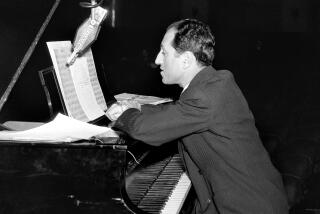Informative but Uneven Evening of Gershwin Tunes
- Share via
George Gershwin’s impact upon jazz was extraordinary. The chord changes to a single song--”I Got Rhythm”--have been the foundation for literally thousands of jazz lines. And numbers such as “Embraceable You,” “Summertime,” “The Man I Love,” “They Can’t Take That Away From Me” and dozens of others have become staples of the jazz repertoire.
Yet, surprisingly, the first two participants in the Skirball Cultural Center’s “Gershwin and Beyond” series--Brad Mehldau and Fred Hersch--included relatively few Gershwin numbers in their presentations. And it remained for Wednesday night’s concert by the far more classically oriented Bryan Pezzone to finally showcase Gershwin’s music in a fashion that more accurately reflected the series’ title.
The results were, at best, uneven, although the program started well with a spontaneous improvisation by Pezzone in the style of Gershwin. Interestingly, this number, as well as several others, was strikingly reminiscent of the sort of pianistically effusive style present in recordings by Gershwin himself.
And, as the evening unfolded, Pezzone’s remarkably quick-fingered technique was always a primary factor--occasionally too much so--in a set that was at its best when it encompassed Gershwin songs (“Someone to Watch Over Me,” “Embraceable You,” “I Got Rhythm,” “A Foggy Day,” among others), as well as the Prelude #2 (with improvisational elaborations).
Beyond the Gershwin, Pezzone made a risky attempt to offer his own spontaneous expansion of a Schubert Impromptu. Despite the massive display of virtuosic firepower he brought to the task, the results too often were little more than superficial crowd-pleasers--snatches of boogie-woogie, pop-style harmonic references, etc.
His closer, yet another set of his own improvised variations, this time on the hymn, “We Shall Overcome,” was similarly over-inflated, and further flawed by a seeming inability to bring the piece to a conclusive ending.
But Pezzone deserves praise for his overall presentation, which was a kind of “informance,” in which he described his own creative process, read from Gershwin’s remarks, and made an effort to pull the audience into the music. Combined with Pezzone’s performance of the Gershwin material, it was as close to the source as the Gershwin and Beyond series ever came.
More to Read
The biggest entertainment stories
Get our big stories about Hollywood, film, television, music, arts, culture and more right in your inbox as soon as they publish.
You may occasionally receive promotional content from the Los Angeles Times.










